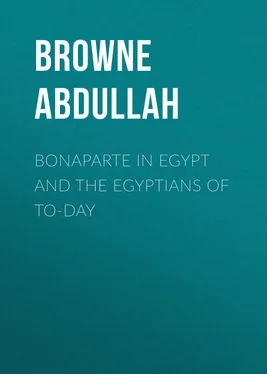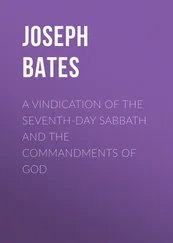Abdullah Browne - Bonaparte in Egypt and the Egyptians of To-day
Здесь есть возможность читать онлайн «Abdullah Browne - Bonaparte in Egypt and the Egyptians of To-day» — ознакомительный отрывок электронной книги совершенно бесплатно, а после прочтения отрывка купить полную версию. В некоторых случаях можно слушать аудио, скачать через торрент в формате fb2 и присутствует краткое содержание. Жанр: Историческая проза, foreign_antique, foreign_prose, foreign_language, на английском языке. Описание произведения, (предисловие) а так же отзывы посетителей доступны на портале библиотеки ЛибКат.
- Название:Bonaparte in Egypt and the Egyptians of To-day
- Автор:
- Жанр:
- Год:неизвестен
- ISBN:нет данных
- Рейтинг книги:4 / 5. Голосов: 1
-
Избранное:Добавить в избранное
- Отзывы:
-
Ваша оценка:
- 80
- 1
- 2
- 3
- 4
- 5
Bonaparte in Egypt and the Egyptians of To-day: краткое содержание, описание и аннотация
Предлагаем к чтению аннотацию, описание, краткое содержание или предисловие (зависит от того, что написал сам автор книги «Bonaparte in Egypt and the Egyptians of To-day»). Если вы не нашли необходимую информацию о книге — напишите в комментариях, мы постараемся отыскать её.
Bonaparte in Egypt and the Egyptians of To-day — читать онлайн ознакомительный отрывок
Ниже представлен текст книги, разбитый по страницам. Система сохранения места последней прочитанной страницы, позволяет с удобством читать онлайн бесплатно книгу «Bonaparte in Egypt and the Egyptians of To-day», без необходимости каждый раз заново искать на чём Вы остановились. Поставьте закладку, и сможете в любой момент перейти на страницу, на которой закончили чтение.
Интервал:
Закладка:
Yet if the reader would rightly comprehend the lesson of this period, he must grasp the fact that in a very full and ample sense all history is a part of one – nay, is but one and the same story writ in different characters. How utterly unlike in all externals are the Gospels written in the Latin, Greek, Arabic, Nagri, or Chinese characters and languages, but the essence and the spirit of all these versions are the same. So it is with the histories of men and nations. The stories of England, France, Spain, India, Egypt, how different! and yet in all that is the final essential of true history – the story of man's combat with his surroundings – the same. It is so because in the last analysis all men are the same, like the ocean, "His Sea in no showing the same – his Sea and the same 'neath all showing."
Scattered in the deserts of Persia, the traveller comes upon isolated villages wherein men and women are born, grow up, marry, beget families, and die, and never once pass beyond the mirage-haunted horizon of their little oasis. With world-encircling ideas and ambitions, the traveller thinks of the mad maelstrom of life in the crowded cities of the West, and wonders that men can be so different and still be men, and yet more so, that between himself and these Persians of the desert, drifting through life in a daily round that never changes, never varies, there should be anything in common. And the wonder is, not that they have the same shape and form as he, that they can cry with Shylock, "If you prick us, do we not bleed? If you poison us, do we not die?" All that is as nothing, since it lifts the man no higher than the brutes of the field, but in all else, in all that is the essential differentia of man, even in these, these children of the waste are such as we, moved by the same passions, stirred by the same affections, urged by the same desires, however variously all these may find expression.
Further yet afield. The miserable Mahars and Mangs of the Indian Deccan, who, living or dead, are held by all the peoples around them as not less vile than the carrion they do not scorn to eat. Even there among these if you will, you may trace, as the venerable missionary Wilson did, deep buried under the man-debasing foulness of their lives, the humanity of the man as the dominating, all-controlling element, severing them by an immeasurable and impassable distance from the noblest of the animals, and linking them by an inseverable bond to the noblest of their fellow-men. All that may characterise the individual outside of this is but the accident of his life and being; the essential element, guiding and swaying him in all things, is this fundamental, ineradicable humanity.
It is the fashion nowadays to speak of the "Brotherhood of man," but how few realise how absolutely, how completely the phrase expresses the simple truth! a truth that nullifies all the arrogantly-arrayed arguments and fancy-founded fallacies of Haeckel and the whole field of Monists and Materialists. If, then, we would understand the Egyptian or any other people, we must start by recognising that, however wide and apparently unbridgable may be the gulf that divides us from them, whether physical, mental, or moral, it has been caused by the rushing flow of the multitudinous circumstances that have moulded the life and character of each, and, as Mill and Buckle have said, not to any originating difference in our natures.
As a boy at school to me history was the dullest of dull tasks, but when I came to mix with the peoples of foreign lands, and, fascinated by the charm of the living kaleidoscope of Indian life, sought some clue to the myriad-minded moods and manners of its peoples, I longed for a history that should tell me how and why these peoples were so different from, and yet so like, my own. But histories, as they are written, are rarely more than chafing-dish hashes of the "funeral baked meats" of court chronicles served up with a posset of platitudes and pedantry for sauce. From such histories we may gather a great array of useless, and, for the most part, perfectly uncertain and unreliable "facts," but of the true story of a people scarce anything more than a few doubtful indications. For true history is no bald chronicle of events but the history of man's, too often blind but always intuitive, struggle towards happiness. Back in those memory forsaken ages, of which even myth and legend now tell us nothing, men strove in the same ceaseless, never-ending struggle. What if the immediate aim of that struggle varied then and now with time and place? What if the dweller in the ice-cold lands of the North should be ever seeking the warmth from which the sunburnt inhabitant of the torrid zone would fain escape? To neither is the heat or the cold a thing to be desired or shunned save only as either serves to swell the total of his enjoyment of life. But just as the nature of the climate in which they dwell modifies their conception of enjoyment, so also a host of other circumstances, some minute and scarcely traceable in their influence, others broad and plainly visible, mould the ideas and ideals of men and nations. Thus, and thus only, is it that the Egyptian and the Englishman are so far apart in all that constitutes the individual or national characteristics of each. Thus it is that the restless activity and energy of the one is abhorrent to the other, and that the Englishman to-day finds the Egyptians, as Herodotus found them so long ago, men "distinguished from the rest of mankind by the singularity of their institutions and their manners." I would, therefore, have my readers avoid the error of judging the Egyptians merely from comparison with their own standards and without due regard to the study of the causes that have made them what they are. If the Egyptian be found lacking in qualities upon the possession of which we justly pride ourselves, he is not for that reason alone to be condemned or despised. He has, even as we have, faults and imperfections that may be justly censured. Like Meredith's Captain de Creye, we are all "variegated with faults." These but attest our common humanity, and for the Egyptian it may at least be said, that he has that charity that covereth a multitude of sins, the charity of heart that far outvalues the charity of the purse. Judged with equity he compares favourably in many points with many other men. Less backward than the Spaniard, less bigoted than the Portuguese, less fanatical than any other Oriental, not embittered in spirit as the Irish Celts, "patient in tribulation," "long-suffering," placable, forgiving, hospitable; honest and withal one who, like Abou ben Edhem, loves his fellow-men, there is much, very much, in the Egyptian that may well serve to gain him the friendship and goodwill of those who seek to know him as he really is. But with all this there is one difference between the Egyptian and all European peoples that, as it seems to me, forms an almost impassible barrier to the growth of close friendship, or even intimate companionship, between the European and the Egyptian. This difference is in their modes of thinking and reasoning, for not until the Ethiopian changes his skin will the Oriental think or reason as a European does.
There are hundreds of volumes wherein the Egyptian is portrayed as he has been seen or known by the authors, but like all other Easterns, the Egyptian is, and perhaps always will be, something of a mystery to the European. The thoughts and reasonings of the two peoples are so constantly and so utterly at variance on points and matters that seem to each to admit of little or no controversy, that any attempt to reconcile them must be abandoned as impossible. It is a natural result of this incompatibility that the Egyptian as commonly described by Europeans is a very different being to the Egyptian as he really is. It is so all over the East, through all the widely differing races, nationalities, and religions of the Asiatic continent with, perhaps, the single exception of the Armenians, who in this respect are as distinctly allied to the races of Europe as the Egyptians are to those of Asia. Tourists wander for an hour or two through the bazaars of Egypt or India and flatter themselves that they have seen and can describe the people: young officials tell you glibly that they can read them as a book: the veteran who has grown grey in their service will tell you that the longer he has known them the less is he able to comprehend them.
Читать дальшеИнтервал:
Закладка:
Похожие книги на «Bonaparte in Egypt and the Egyptians of To-day»
Представляем Вашему вниманию похожие книги на «Bonaparte in Egypt and the Egyptians of To-day» списком для выбора. Мы отобрали схожую по названию и смыслу литературу в надежде предоставить читателям больше вариантов отыскать новые, интересные, ещё непрочитанные произведения.
Обсуждение, отзывы о книге «Bonaparte in Egypt and the Egyptians of To-day» и просто собственные мнения читателей. Оставьте ваши комментарии, напишите, что Вы думаете о произведении, его смысле или главных героях. Укажите что конкретно понравилось, а что нет, и почему Вы так считаете.












